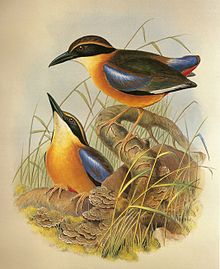- Mangrove Pitta
-
Mangrove Pitta 
Mangrove Pitta by Gould & Richter, 1850-1854 Conservation status Scientific classification Kingdom: Animalia Phylum: Chordata Class: Aves Order: Passeriformes Family: Pittidae Genus: Pitta Species: P. megarhyncha Binomial name Pitta megarhyncha
Schlegel, 1863The Mangrove Pitta (Pitta megarhyncha) is a species of passerine bird in the Pittidae family native to Southeast Asia. It is part of a superspecies but has no recognized subspecies.
Contents
Taxonomy
The Mangrove Pitta was first described by German ornithologist Hermann Schlegel in 1863.[2] Its species name is derived from the Ancient Greek words mega- "large", and rhynchos "beak". It forms a superspecies with the Indian Pitta (P. brachyura), Fairy Pitta (P. nympha) and Blue-winged Pitta (P. moluccensis). Alternate common names include: Larger Blue-winged/Malay Pitta, Brève des palétuviers (in French), Große Blauflügelpitta (in German), and Pita de Manglar (in Spanish).[3] There are no recognized subspecies.[4]
Description
Kuala Selangor, Malaysia, Aug 1994
Measuring 180–210 mm (7.1–8.3 in) in length, the Mangrove Pitta has a black head with a buff-coloured crown, white chin and buff underparts. The shoulders and mantle are greenish and the vent is reddish. Juveniles have similar patterned plumage but are duller. It resembles the Blue-winged Pitta but can be distinguished by its much heavier bill.[5] Its call, transcribed as wieuw-wieuw has been noted to be "more slurred" than the Blue-winged Pitta.[5]
Distribution and habitat
The Mangrove Pitta is native to the Southeast Asian countries of: Bangladesh, India, Indonesia, Malaysia, Myanmar, Singapore, and Thailand (primarily the west coast of the southern Thai peninsula).[1][2][6] Its natural habitat is specialised and restriction to subtropical or tropical mangrove forests and Nipa palm stands.[7] It is threatened by habitat loss. Its diet consists of crustaceans, mollusks and terrestrial insects.[1][2][7]
Behaviour
While all Pittas are noted for being difficult to study and spot in the wild, the Mangrove Pitta is one of the easier ones to spot as it sits high up in mangrove trees and calls.[6] A tape recording of its call will often bring it forth.[8] It tends to be vocal while brooding but quiet at other times.[7]
References
- ^ a b c "Mangrove Pitta Pitta megarhyncha". BirdLife International. http://www.birdlife.org/datazone/speciesfactsheet.php?id=4020. Retrieved 4 June 2011.
- ^ a b c "Pitta megarhyncha". IUCN Red List. IUCN. http://www.iucnredlist.org/apps/redlist/details/144963/0. Retrieved 4 June 2011.
- ^ "Mangrove Pitta (Pitta megarhyncha)". Internet Bird Collection. http://ibc.lynxeds.com/species/mangrove-pitta-pitta-megarhyncha. Retrieved 4 June 2011.
- ^ "Species overview :: Mangrove Pitta (Pitta megarhyncha)". Xeno-Canto Asia. http://www.xeno-canto.org/asia/species.php?species_nr2=9044.00. Retrieved 4 June 2011.
- ^ a b Robson, Craig (2005). New Holland field guide to the birds of South-East Asia. Kenthurst, New South Wales: New Holland Publishers. p. 76. ISBN 1843307464. http://books.google.com.au/books?id=MZh_isKvAQ8C&pg=PA76&dq=%22Mangrove+Pitta%22&hl=en&ei=RizqTcH0LIfhiAKF9r2UAQ&sa=X&oi=book_result&ct=result&resnum=7&ved=0CFMQ6AEwBg#v=onepage&q=%22Mangrove%20Pitta%22&f=false. Retrieved 4 June 2011.
- ^ a b "Pittas of Thailand". Thai Birding. http://www.thaibirding.com/features/pittas.htm. Retrieved 4 June 2011.
- ^ a b c Lok, A. F. S. L.; K. T. N. Khor, K. C. Lim, and R. Subaraj (1 April 2009). "Pittas (Pittidae) of Singapore" (PDF). Nature In Singapore (National University of Singapore) 2 (2): 155–165. http://rmbr.nus.edu.sg/nis/bulletin2009/2009nis155-165.pdf.
- ^ Strange, Morten (2000). Photographic Guide to the Birds of Southeast Asia. Singapore: Periplus. p. 219. ISBN 962-593-403-0.
External links
Categories:- IUCN Red List near threatened species
- Pitta
- Birds of India
- Birds of Bangladesh
- Birds of Indonesia
- Birds of Malaysia
- Birds of Singapore
- Birds of Thailand
- Birds of Burma
- Animals described in 1863
Wikimedia Foundation. 2010.

